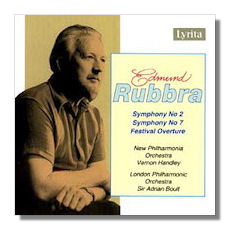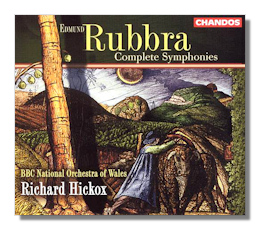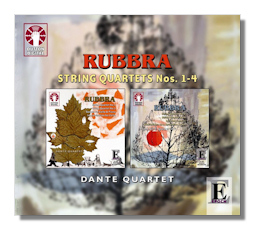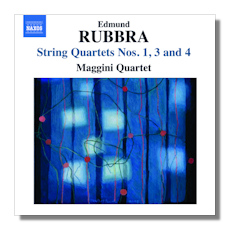
The Internet's Premier Classical Music Source
Related Links
-
Find CDs & Downloads
Amazon - UK - Germany - Canada - France - Japan
ArkivMusic - CD Universe
Find DVDs & Blu-ray
Amazon - UK - Germany - Canada - France - Japan
ArkivMusic-Video Universe
Find Scores & Sheet Music
Sheet Music Plus -
Recommended Links
Site News
Edmund Rubbra

(1901 - 1986)
Edmund Rubbra (birth name Charles Edmund Duncan-Rubbra, May 23, 1901 - February 14, 1986) was born in the East Midlands town of Northampton to a poor, though musical, working-class family. He received lessons in piano and elementary music theory. At 14, he left school to help support the household, employed as an office boy and later as a railway clerk. His uncle owned a music shop, and there Rubbra discovered the music of Cyril Scott, which so excited him that he got up a concert of Scott's music. Scott heard about it and took on Rubbra as a private pupil. In 1920, Rubbra won a scholarship to Reading University, where he studied with Gustav Holst, and the following year won an open scholarship to the Royal College of Music, where his teachers included Gustav Holst, R.O. Morris, and Ralph Vaughan Williams. He had his first works published while still a student.
He left the RCM in 1925 and supported himself as a rehearsal pianist and private teacher. He also began writing music criticism for publications like The Listener. During World War II, the government conscripted Rubbra, violinist Erich Gruenberg, and cellist William Pleeth into a piano trio to play for the troops. After the war, the trio performed internationally until it broke up in the Fifties. Rubbra taught at Worcester College, Oxford, as well as the Guildhall School. Throughout the Thirties, Rubbra could be described politically as a humanitarian leftist. In 1948, he converted to Roman Catholicism, although Eastern mystical thought and Teilhard de Chardin (the dedicatee of his Symphony #8) also influenced him. In 1963, he became a CBE.
Rubbra's reputation rests mainly on his 11 symphonies, begun in 1935 and ending in 1979. They do not rely on the standard architectural forms and instead proceed contrapuntally, much like Holst's Egdon Heath. They have been called "Tudor fantasias for symphony orchestra." Rubbra has remarked that "I never know where a piece is going to go next. … When I begin, my only concern is fixing a starting point that I can be sure of. … My imagination discovers the architecture for me." It sounds like a recipe for confusion, but Rubbra's music holds together with tight logic. He accomplishes this in several ways: using basic cells of notes, laying out full-blown complete themes, or even emphasizing a small number of intervals. There are also major concerti for violin, piano (including an early Sinfonia concertante), and viola, as well as concerted pieces for violin and for cello. His most-played piece, however, remains his 1938 orchestration of Brahms's Variations and Fugue on a Theme of Handel.
Rubbra has been praised for both his chamber and his vocal music. Highlights include four string quartets, Meditazioni sopra "Couers désolés", Prelude and Fugue on a Theme by Cyril Scott, a Sonatina for recorder and harpsichord, The Morning Watch, 5 Motets, 5 Madrigals, 4 Medieval Latin Lyrics, 5 Spenser Sonnets, Amoretti, Missa in honorem Sancti Dominici, and the choral Symphony #9 "Sinfonia sacra".
Post-war, although he continued to receive commissions and performances, Rubbra's music lost the interest of the critical fraternity, even within Britain, as the reputations of Benjamin Britten and the European avant-garde rose. Furthermore, at the peak of his career, he stood in the shadow of Vaughan Williams, Britten, and William Walton, although Vaughan Williams regarded his work highly. To some extent, he was always a "composer's composer," without a genuine popular hit. His sensibilities lay too far from popular taste, and he had little interest in opera, ballet, or film music, often routes to popularity. Nevertheless, he has retained and even won back the respect of performers. His complete cycle of symphonies as well as several major works have current recordings. ~Steven Schwartz

Recommended Recordings
Symphonies
- Symphony #2, Op. 45; Symphony #7, Op. 88; Festival Overture, Op. 62/Lyrita SRCD235
-
Vernon Hadley/New Philharmonia
- Symphony #3, Op. 49; Symphony #4, Op. 53; Resurgam, Op. 149; A Tribute, Op. 56/Lyrita SRCD202
-
Norman Del Mar/Philharmonia Orchestra
- Symphony #6, Op. 80; Symphony #8 "Hommage à Teilhard de Chardin", Op. 132; Soliloquy, Op. 57/Lyrita SRCD234
-
Norman Del Mar/Philharmonia Orchestra
- Symphony #10 "Sinfonia Da Camera", Op. 145; A Tribute for Ralph Vaughan Williams, Op. 56; Improvisations on Virginal Pieces by Farnaby, Op. 50/Chandos CHAN6599
-
Hans-Herbert Schönzeler/Bournemouth Sinfonietta
- Complete Symphonies/Chandos CHAN9944(5)
-
Lynne Dawson (soprano), Della Jones (alto), Stephen Roberts (baritone), Stephen Roberts (bass), Richard Hickox/BBC National Orchestra & Chorus of Wales
Chamber Music
- Violin Sonatas #1-3, Opp. 11, 31 & 130; ; Pieces for Violin & Piano, Op. 29; Theme & Variations on a Phyrgian Theme for Solo Violin, Op. 105/Dutton CDLX7101
-
Krysia Osostowicz (violin), Michael Dussek (piano)
- Piano Trios #1 & 2, Opp. 68 & 138; Oboe Sonata, Op. 100; Duo for English Horn & Piano, Op. 156; Meditazioni sopra "Cœurs Désolés" for Oboe & Piano, Op. 67; Phantasy for 2 Violins & Piano, Op. 16; "The Buddha" for Flute, Oboe, Violin, Viola & Cello, Op. 64 /Dutton CDLX7106
-
Endymion Ensemble
- String Quartets #1-4, Opp. 35, 73, 112 & 150; Lyric Movement for Piano & String Quartet, Op. 24; Meditations on a Byzantine Hymn "O Quando in Cruce", Op. 117; Improvisation for Cello, Op. 124; Cello Sonata, Op. 60/Dutton LXBOX2010
-
Krysia Osostowicz (viola), Judith Busbridge (viola), Pierre Doumenge (cello), Michael Dussek (piano), Dante Quartet
Amazon - UK - Germany - Canada - France - Japan - ArkivMusic - CD Universe
Or available individually -
Dutton CDLX7123
Amazon - UK - Germany - Canada - France - Japan
Dutton CDLX7114
Amazon - UK - Germany - Canada - France - Japan - CD Universe - JPC
- String Quartets #1, 3 & 4, Opp. 35, 112 & 150/Naxos 8.572555
-
Maggini String Quartet
- Quartet for Strings #2, Op. 73; Piano Trio #1, Op. 68; "Amoretti", Op. 43; "Ave Maria Gratia Plena"/Naxos 8.572286
-
Charles Daniels (tenor), Maggini String Quartet


















